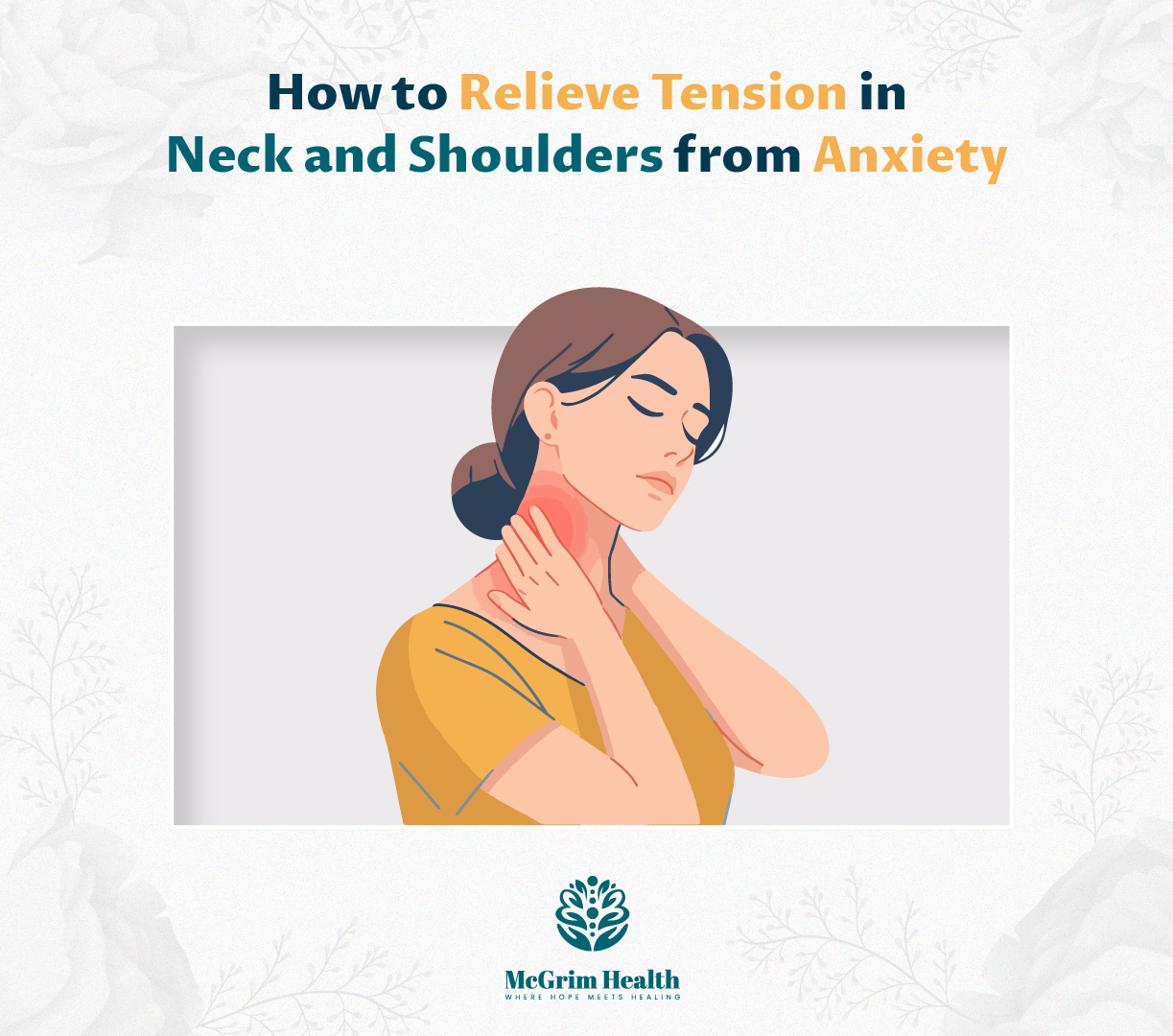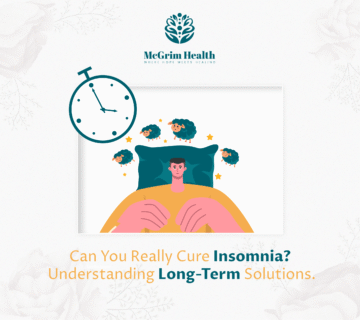Anxiety often shows up in different ways, affecting our mental and physical health. A standout effect is a constant tension in the shoulders and neck. It can become a lasting burden.
Living with this constant strain can weigh you down, making things tough. Having your neck and shoulders always tense because you are stressed can be hard physically and emotionally.
The good news is that help is available. Simple practices can help reduce this tension, letting calm return.
Anxiety can be hard to handle. But do not worry, McGrim Health is here for you. We are committed to helping you overcome your health worries.
Our team provides excellent ways to manage anxiety. These include therapy, self-understanding methods, and medicines. Contact us for more information.
If you’re wondering, “How to relieve tension in neck and shoulders from anxiety?” Below we will outline helpful tips and techniques to know how to relax neck and shoulders.
How Do Stress and Anxiety Cause Tension in Your Neck and Shoulders?
Feeling stressed or anxious can make your muscles contract, possibly with great force. This reaction, known as the “fight or flight” response, is the body’s method to handle or avoid danger.
Besides muscle tension, you might also experience:
- A racing hearts
- Shallow breathing
- Cold skin
- Sweating
Not just physical stress, even situations like traffic jams or job-related stress make your body respond in the same way.
Without relief, this tension could persist, making your muscles stiff for a longer duration. This constant strain might start causing problems.
You might start suffering from, backache, body soreness, headaches, depression, and neck pain.
How to Relieve Tension in Neck and Shoulders from Anxiety?
Mindful Breathing
Taking slow, deep breaths helps calm your mind and relax your body. Focusing on your breath can take your mind off stress and ease muscle tightness.
Stretching
Stretching regularly can make your muscles more flexible and reduce stiffness. Simple neck and shoulder stretches done often can help prevent and relieve pain.
Heat Therapy
Using methods like hot towels or warm baths increases circulation to tender areas. This can ease muscle tension and help with healing.
Neck and Shoulder Massage
Massage relieves tight muscles in your neck and shoulders. It lets loose endorphins, your body’s pain blockers. They help in relaxation.
Typical massages involve deep tissue, trigger points, and Swedish techniques. If a professional massage is not possible, consider a roller ball for self-massage.
Handy massagers can also help if you are on your own. Or, make a “C” with your hand. Apply pressure on achy areas for a bit. After that, let go and switch to a different muscle.
Use Sensory Activities
Actions such as aromatherapy are great for decreasing stress. Essential oils, lavender, and chamomile as examples, are effective in promoting relaxation and relieving tense shoulders and neck.
Keep Good Posture
Take care to arrange your workstation to prevent strain on your neck and shoulders. Level your computer screen with your eyes, and ensure your chair backs you up well.
Stay Active
Exercise releases chemicals that relieve pain and stress. Even a short walk can help reduce muscle tightness and stress. Regular exercise also helps you sleep better, which helps manage stress and anxiety.
Exercises That Reduce Tension in Your Neck and Shoulders
Neck Stretches
Neck stretches can help reduce neck and shoulder pain from stress. They can also improve your movement range and relieve tension.
- Stand up straight, your arms hanging down.
- Rest your right hand on your head and softly pull your head right.
- You’ll feel a stretch in your neck’s left side. After a short pause, come back to the center.
- Now, do the same stretch on the left.
- Do this routine a few times, gently and focused.
Shoulder Rolls
This simple exercise can be done while sitting at your desk to relax your neck and shoulders. Shoulder rolls loosen tight muscles and increase flexibility, reducing discomfort, pain, and stiffness.
- Let your arms hang down your body, then move your shoulders in a forward circular motion a few times.
- After that, circle them backward.
- Making this a habit will help relieve muscle stress from anxiety.
Cat-Cow Pose
This yoga posture can relieve stiff neck and back pain. It helps reduce body tension and encourages spine mobility. Let’s gain insight into performing it:
- Start by placing your hands and knees on the ground, making sure your wrists and shoulders, and your knees and hips align.
- Take a breath and move into the cat pose. Raise your chin and chest while letting your stomach lower towards the ground.
- Keep your chest and shoulders open, look up, and pause.
- Release your breath and move into the cow pose. Pull your stomach into your spine and curve your back, looking downwards.
- Pause briefly. Take another breath and repeat the steps.
Child Pose
The Child’s Pose, or Balasana, is a yoga move that can help relax your neck and back.
- Get on your hands and knees, palms facing the floor.
- Your wrists should match up with your shoulders, knees under hips.
- Rest on your heels, give your spine a nice stretch, and extend your hands forward.
- Hinge from your hips, lean ahead, arms staying stretched out.
- Keep this position for 1 to 1.5 minutes.
- Deep breaths can ease the tension in your neck and shoulders.
- Return to the initial position and repeat.
- Try these 2 or 3 times.
Progressive Muscle Relaxation
Progressive muscle relaxation can help with chronic neck pain and stress. It helps relax your neck and shoulders.
- Tighten each muscle group in your body and hold for a few seconds.
- Breathe out and relax the muscles for a few seconds.
- Repeat for each muscle group to relieve tension.
Simple Ways to Relieve Neck and Shoulder Tension at Home
Here are some effective home remedies for relieving neck and shoulder tension:
- A 15-20 minute warm pad or cloth application to the neck and shoulders.
- An ice pack, shielded with a cloth, to reduce inflammation for a similar duration.
- A muscle-relaxing warm bath with Epsom salts.
- Easy neck and shoulder stretch for enhancing flexibility and fighting stiffness.
- Fingers or foam roller massage on the troubled area to untie tension knots.
- Peppermint essential oil, in a diluted form, offers a chill feel and helps in muscle relaxation.
- Lavender essential oil usage leads to calmness.
- Drink plenty of water to maintain muscle hydration and avert cramps.
- Preserve proper posture to lower the pain in the neck and shoulders.
- Incorporate yoga or tai chi for effective stretching and relaxation.
When to Seek Professional Help?
If you are dealing with stress-related shoulder pain, get expert help. Experts can spot any hidden issues and provide the right treatments or therapies.
To Wrap It Up- How to Relieve Tension in Neck and Shoulders from Anxiety?
Think about reducing tension in your neck and shoulders from anxiety with effective methods.
Practice relaxing habits, maintaining good posture, exercising regularly, and self-care are key.
Including these habits in your everyday life will start to improve physical comfort, tackling anxiety with success.
Keeping your mental and physical health in check is essential for a total sense of wellness.
FAQs
Why are my shoulders so tight?
Stress, bad posture, or using your shoulder muscles too much can make them tight. By doing stretches often, sitting and standing the right way, and learning to relax, you can relieve this tight feeling.
Does stress cause shoulder pain?
Yes, stress can cause shoulder pain as it often leads to muscle tension and tightness in the shoulders. This tension can result in discomfort and pain over time.





No comment